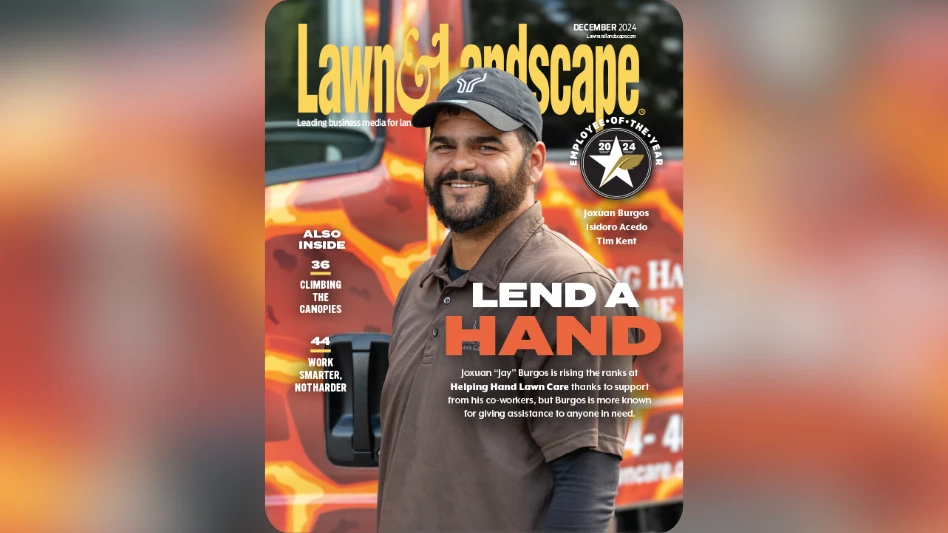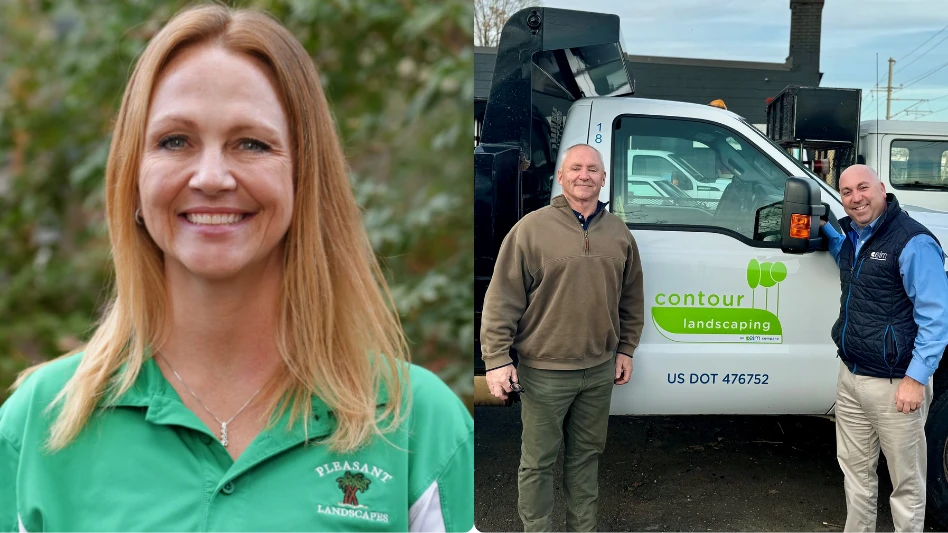
 A family concrete business with deep construction roots in Denver merges with a designer/gardener with architectural sensibilities. Invention melds with craftsmanship. Ideas become concrete.
A family concrete business with deep construction roots in Denver merges with a designer/gardener with architectural sensibilities. Invention melds with craftsmanship. Ideas become concrete.
It’s a happy marriage at Bloom Concrete and Landscape in Lakewood, Colo., where Micah and Lauren Bloom provide boutique landscape design and construction services to clients who value the art.
“We have made a niche for ourselves in the historical Denver neighborhoods with smaller properties where every square foot counts,” Lauren says.
Micah adds, “Those historic areas may have a smaller yard, but it’s about making the very best use of every spot on that property.” That work has garnered industry award recognition. In 2012, Lauren was named an Outlook Emerging Leader by the Associated Landscape Contractors of Colorado.
Bloom’s small-scale approach applies to its personnel, too. The firm has just one crew, “and we really like to operate that way,” Lauren says. The company prefers those intimate spaces that fall into its design sweet spot. Bigger isn’t always better. And Bloom incorporates concrete into its designs by seriously considering how this element impacts plants and other landscape features.
With an eye on sustainability and structural integrity, Bloom wins over clients who want a dedicated firm that can take a landscape from concept to finish. “Our clients really want a company that will be there fulltime and not jump between projects,” Lauren says.
A Solid Foundation.
 Bloom Concrete and Landscape came together in 2009, when many landscape and construction companies were falling apart. But the Denver market was much more stable than other areas of the country, Micah says. Thanks to his and Lauren’s experience and contacts in the area, launching a business during the recession was feasible.
Bloom Concrete and Landscape came together in 2009, when many landscape and construction companies were falling apart. But the Denver market was much more stable than other areas of the country, Micah says. Thanks to his and Lauren’s experience and contacts in the area, launching a business during the recession was feasible.
That’s not to say hard times didn’t touch Bloom. “We were impacted by it,” Micah says. “That is why we wanted to find a niche, And we had reliable clients that liked our work, and our quality of work, who kept coming back to us.”
Before Bloom, Lauren had a company she started out of college in 2001, Yve’s Garden Landscapes, where she designed annual beds and pot displays. In 2000, Micah started Colorado Concrete Specialist, a family venture that involved his father, uncles and cousins. Concrete runs in the family since Micah’s grandfather, Oscar, started pouring concrete in Denver in 1954.
“He did concrete three days a week in Denver. They had a farm in Fort Morgan where he would farm three days a week and do church on Sunday,” Micah says.
Micah’s father eventually joined his grandfather’s construction crew, along with his two uncles. People in the area know the Bloom name. “I have clients who said, ‘Well, your uncle built my house,’ or, ‘Your granddad poured my driveway.’ A lot of the old-timers I run into see the name on my truck and remember working with my dad or uncle in the 1980s.”
Bloom was gaining its first clients during a time when many residents were cutting back services rather than investing in projects, that family name and Lauren’s existing client base made all the difference. The start-up had deep roots, and that mattered. “In the rough times, those clients (who know you) are who you rely on,” he says.
|
Talking up the industry How to grow veggies in a drought year. Recover your garden from hail damage. Keep the pests away from your garden. And, why not add chickens? These topics and more fill the airwaves on Colorado’s Channel 9 News, where Lauren Bloom, co-owner of Bloom Concrete and Landscape, addresses landscape concerns and educates the public with helpful how-tos that include an important call-to-action: Consider a pro. The monthly garden segments are fun to produce, Lauren says. “And, it has been good in promoting our industry association,” she adds of the company’s involvement in the Associated Landscape Contractors of Colorado. Bloom doesn’t necessarily receive customer calls for service because of the television spots. “But it qualifies us to potential clients,” Lauren says. Meanwhile, Lauren and Micah Bloom provide education to industry peers and students by teaching classes at industry events, and participating in career days at local high schools and colleges. “We help people understand, this is one way you could go with your career with design,” she says. “We are trying to encourage growth in the industry – and not just growth, but quality growth.”
|
Bloom Concrete and Landscape has grown from a $300,000 firm in 2009 to about $600,000 last year.
The size of its projects has also increased, Lauren says, though she says the firm is perfectly poised to manage those that are about $50,000 and less. It goes back to their desire to design and build right-sized spaces for clients.
“We like to travel and we are always taking pictures and getting ideas,” Lauren says. “We really enjoy the design aspect of the business, and we are always learning more about how spaces can be used.”
The Power of One.
There was a time in 2010 when Bloom expanded its core crew and ran with two. “We really didn’t like that,” Micah says. “We felt like the quality of the projects we were on wasn’t to the standards that we wanted and expected.”
Micah is the project manager on jobs. He’s there in the field, working alongside the crew and ensuring that the design is properly executed. Lauren is the landscape designer. They have an employee who helps with office matters and in the summer, the “core” expands to about five people who do everything from pouring concrete to planting to installing irrigation systems.
“They are skilled in everything turf-related, and it’s really important to us that we keep people like that, and that we keep training them, too,” Lauren says. “Often we’ll do projects that involve a new skill we haven’t tried, so we will give them the tools they need to expand their knowledge to do it correctly and up to industry standards or above.”
Operating with a single, skilled crew suits Bloom’s business philosophy to be present for clients. During the 2010 season when they decided to expand, the drive time between projects and hustling compromised quality. “We were losing track of our time, spending too much time going between job sites and trying to sell too much,” Micah says.
Tasks on a job were slipping through the cracks. “Micah was going back and forth between projects and it felt like he was just correcting errors and cleaning up more problems than if he had been on the site full-time,” Lauren says.
Paring the team back to a single crew was the best decision for Bloom. Though, this structure means there is a limit to how much work the firm can accept – at least in the construction aspect of the business. There have been times when backlog is six months. Lauren is quick to add that the company always squeezes in smaller projects for regular clients.
“That backlog has triggered us to make an adjustment to what we do,” Lauren says, noting how the business has grown its design services. “We can turn around designs in three to four weeks.” That includes a couple of client meetings and a detailed property walk-through.
At that point, Bloom connects the client with one of a few select contractors in the area to execute the design. Bloom stays connected as a consultant during the process. “We don’t have to say no to these new clients who are calling us from referrals because our backlog is too long,” Lauren says.
“We can still offer the design services, which in a lot of cases, is what companies are lacking: a well thought out design that is spelled out so that with a good contractor, the project will be what the client wants.” Meanwhile, the Blooms find that their clients want the whole design at once, but prefer to have construction completed in phases. That way, the company can stay small in crew size, and still say ‘yes’ to clients.
The Blooms see the design and consulting side of their business continuing to expand. That’s their hope. They want to maintain some construction while deepening the design business.
“We are really excited about doing more design work and consulting – being a general contractor sort of company that can look over each project and make sure clients are getting what they are paying for,” Micah says.

Explore the July 2015 Issue
Check out more from this issue and find your next story to read.
Latest from Lawn & Landscape
- Our Holiday Lighting Contest rolls on
- LawnPro Partners acquires Ohio's Meehan’s Lawn Service
- Landscape Workshop acquires 2 companies in Florida
- How to use ChatGPT to enhance daily operations
- NCNLA names Oskey as executive vice president
- Wise and willing
- Case provides Metallica's James Hetfield his specially designed CTL
- Lend a hand






